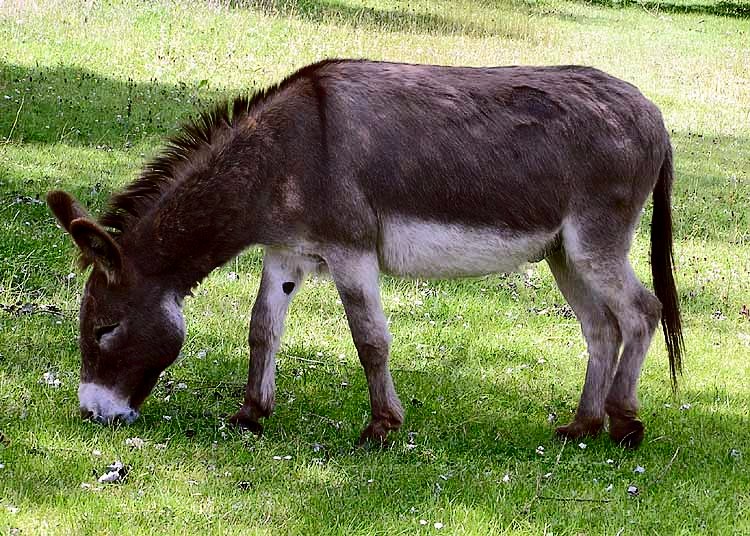Donkey Facts For Kids
Donkeys are domesticated members of the Equidae family, known for their strength, intelligence, and strong social bonds.


Set reading age
View for Kids
Easy to read and understand
View for Students
Clear, detailed explanations
View for Scholars
Deep dives and big ideas
Introduction
Donkeys are friendly animals known for their long ears and braying sound! 🐴They belong to the Equidae family, which also includes horses and zebras. Donkeys come from various parts of the world, especially Africa and Asia. They have been domesticated for thousands of years. Donkeys are usually grey or brown, and they can weigh between 400 to 1,200 pounds! They are about 3 to 5 feet tall at the shoulder. Donkeys are known for being strong, gentle, and hardworking animals that help humans with many tasks.
Gallery of Donkey Facts For Kids
Biology And Anatomy
Donkeys have some unique body features! 🦷Their long ears help them hear well, even over long distances. A donkey's hooves are specially designed to support their heavy bodies on rocky terrains. Their eyes are located on the sides of their heads, allowing them to see almost all around without turning! Donkeys’ teeth grow continuously throughout their lives, which helps them eat tough plants. Their tails, just like horses, help them swat away pesky flies! Donkeys can live for about 25 to 30 years, and some even live longer with good care!
Roles In Agriculture
Donkeys play a super important role in farming! 🌾They are often used as pack animals, carrying heavy supplies across fields and mountains. In some countries, people use donkeys to plow fields or pull carts. The strong bodies of donkeys allow them to carry out these hard tasks easily. Donkeys can also eat food that many other farm animals can’t digest, like dry grasses! This makes them great for helping farmers by keeping the land clear. In many regions, donkeys are essential to farmers’ daily lives and agricultural success.
Cultural Significance
In many cultures around the world, donkeys hold special meanings! 🎉In Mexican traditions, the donkey is often celebrated during the festive event called "La Posada." In parts of the Middle East and Africa, donkeys are seen as symbols of hard work and resilience. In America, the famous cartoon character "Eeyore" from "Winnie-the-Pooh" has delighted children and adults alike, representing the kind-hearted nature of donkeys. Donkeys often symbolize patience and humility in various cultures and are cherished by many for their gentle spirits.
Domestication History
Donkeys were first domesticated about 5,000 to 6,000 years ago, mainly in northeastern Africa, around Egypt and the Sahara Desert. 🌍People started using donkeys for transportation and carrying heavy loads. The wild ancestor of a donkey is called the African wild ass, which is now endangered. Farmers all over the world, from Asia to Europe and the Americas, depend on donkeys for help. Because of their strength and calmness, donkeys became vital for farming and trade. Today, many donkeys are still used in rural areas to assist humans with daily tasks!
Fun Facts About Donkeys
Did you know donkeys have incredible memories? 🌈They can remember places and fellow donkeys for over 25 years! They also kick for self-defense, so it’s best to approach them carefully. Donkeys can make friends with various animals, even cats and dogs! A group of donkeys is called a "drove," and they can recognize their owner’s voice. 🗣️ Some donkeys enjoy playing games, like hide and seek! Lastly, donkeys can be quite vocal, braying loudly to express their feelings. Aren’t they amazing animals? 💖
Conservation And Welfare
Donkeys need our help to stay safe and happy! 🛡️ Many wild donkey species, such as the African wild ass, are endangered due to habitat loss and hunting. It’s important to support organizations that protect donkeys and their habitats. Many donkeys live in tough conditions, facing neglect or mistreatment. We can help by adopting donkeys, spreading awareness, and supporting shelters looking after these amazing animals. Educating people about proper care can improve the lives of donkeys everywhere, ensuring they remain our wonderful companions for many years to come!
Famous Donkeys In History
Donkeys have appeared in many stories and legends throughout history! 🌟One of the most famous is the donkey in the biblical story of Balaam, who spoke to his master. There is also the donkey named "Ee-oh," from the beloved children's book "Winnie-the-Pooh" by A.A. Milne. Donkeys have served many roles in war, from carrying supplies to being mascot animals. Famous historical figures, like Alexander the Great, have also used donkeys for travel. Today, donkeys continue to inspire stories, movies, and cartoons!
Behavior And Social Structure
Donkeys are social animals who prefer to live in groups! 🐾They often form close bonds with other donkeys and can become very attached to their friends. In the wild, donkeys live in families that help protect each other from dangers like predators. They communicate using sounds, like braying, and body language such as ear position. Donkeys are known to be very intelligent, often learning tricks and commands quickly. They can also remember places and other donkeys for years! Their gentle and curious nature makes them enjoyable companions.
Donkey Facts For Kids Quiz


Make things. Learn new skills. Share safely.
DIY is a creative community where kids draw, build, explore ideas, and share.
No credit card required